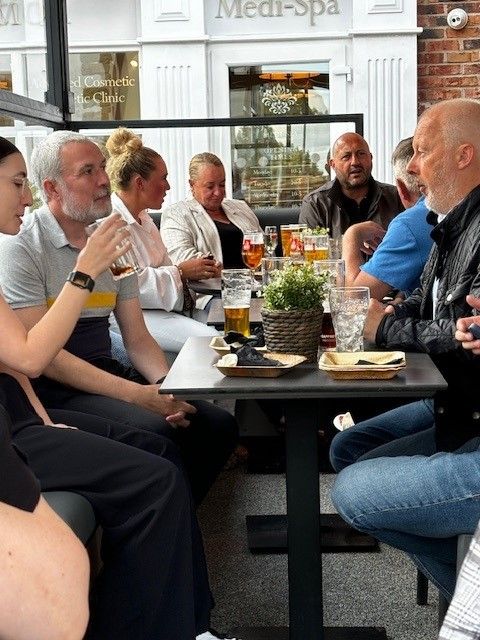Chambers of Commerce challenge PM to meet five business tests for Covid restrictions
Dear Prime Minister,
We write on behalf of business communities the length and breadth of the UK at this critical point in our evolving battle against the Coronavirus pandemic.
Our starting point is clear: no amount of financial support can compensate for an open, fully-functioning economy.
Yet with increasing, tiered restrictions – and with more severe ‘circuit breaker’ restrictions under consideration or
underway – the situation for business grows graver by the day.
While the recent announcement of an enhanced Job Support Scheme will assist some firms, Chamber members tell us it will not be enough to stave off mass redundancies and business failures. Enhanced support must be given to those facing the indirect impacts of restrictions and closures – in supply chains, tourist destinations and town and city centres. This is particularly the case for businesses in ‘high’ / tier 2 areas, where firms are technically able to open but where demand has been hit dramatically due to government restrictions. Chambers are clear that any new restrictions must go hand-in-hand with truly commensurate financial support for wages and day-to-day running costs.
The UK needs a strategy that allows us to avoid economic paralysis and to manage the impact of the virus on our
communities over the longer term. Business throughout the country have worked incredibly hard to implement
Government guidance and create a Covid-secure environment for their employees, visitors and customers. The need for additional restrictions cannot be blamed on a lack of care by dedicated employees in businesses across the country.
Instead, it demonstrates the failures of short-term decision-making and of Test and Trace systems, which must
be urgently improved and expanded. The British Chambers of Commerce have devised five business tests that must be met to limit the impact of new restrictions on businesses and jobs, and take a long-term approach to tackling the virus. Failure to meet these tests now will put the future of the economy and the country at risk.
1. Are the restrictions evidence-based and targeted effectively?
- There is a strong body of expert opinion that the proposals will be effective, are necessary and are targeted
effectively. - The medical and scientific material and advice which inform decisions (including options not followed)
is published without delay along with those decisions. - There are no ways in which the restrictions have a disproportionate effect on
business or are counterproductive. For example, some businesses tell us that they would rather be closed by
order under Tier 3, due to the design of the current support on offer, than have to close because restrictions have
destroyed demand in a Tier 2 area. - Bearing in mind the significant steps businesses have taken to become Covid-secure, they allow as many
businesses as possible to remain as open and operational as possible. - There is strong co-ordination between HM Government, Devolved Administrations, Mayoral Combined
Authorities, Local Authorities and others, including businesses.
2. Are the restrictions clear and do businesses have time to prepare?
- Business communities have been consulted on the design of the restrictions.
- There is clarity on which businesses are affected, how, and when.
- The changes have been communicated clearly, so that each business can understand the implications for them
and their (geographically diverse) supply chains and workforce. - There is consistency of messaging across local and national government, and enforcement agencies are clear from
the get-go about new rules and how they should be applied. - Businesses have been given time to prepare for the change.
3. Is support for businesses commensurate with the impact on them?
- Financial support that adequately compensates businesses for the damage caused by restrictions and prevents
business failures is in place. The July model of the furlough (CJRS) scheme, built up to include the many previously
exempted businesses, is the starting point for this. - Adequate support is available both for those businesses directly impacted (e.g. forced to close) and those
indirectly impacted (e.g. supply chain, fall in demand). - Cash flow support is in the form of grants or easements (e.g. reduced VAT), rather than just additional
forbearance or more debt. - Support packages are set for the longer-term period, at least 12 months, giving businesses the certainty they
need to plan ahead. Ideally, businesses should be able to plan now for the entirety of 2021.
4. Will the time that the restrictions are in place be used to significantly improve the Test, Trace and Isolate system?
Test, Trace and Isolate will be improved during the period of the restrictions for all areas, with a clear plan to
meet the necessary standards to manage the disease (in terms of coverage, speed of response and effectiveness
of tracing and isolation). In particular:
- link more recognised and approved tests to the NHS test and trace system. No test is perfect, but rapid
testing with follow-ups where required would help keep businesses and schools open and operating. It
would also help our airports and restore key business connections around the world; - use the government’s purchasing power to drive down testing costs for private employers. With clear
standards and procurement at scale, frequent low-cost testing could be introduced in workplaces of all
sizes and sectors; - harness private sector and university partners to rapidly increase test-processing capacity;
o share the load. Resources and responsibilities should be devolved to local and regional level in order to
increase effectiveness of the system.
5. Is there a clear process for increasing and decreasing restrictions?
- The relevant communities understand what the test will be for introducing, increasing, removing or limiting the restrictions.
- There is clarity over the metrics being applied (e.g. is the key test the R rate, hospital admissions, etc?), review
points and the likely length of time restrictions will be in place. - There is a road map for exiting the restrictions, for each area affected, agreed with local stakeholders, and a
shared consensus of how it will be achieved. - Over the critical weeks ahead, these tests must be met – to avoid serious damage to business and consumer confidence, and potentially catastrophic economic consequences. We must preserve our economy in the immediacy, while also laying the foundations for future growth. Failure to support viable businesses now will undermine any broader efforts to ‘level up’ left-behind parts of the UK.
- The Coronavirus is not going away anytime soon. Governments must waste no more time in setting out a clear strategy to keep the economy functioning, while protecting public health over the long term.
- In the interests of business communities across the United Kingdom, we would ask you to respond within seven days, setting out how current and proposed restrictions will meet these tests.
Yours sincerely
Dr Adam Marshall
Director General, British Chambers of Commerce
Baroness Ruby McGregor-Smith CBE President, British Chambers of Commerce
Russell Borthwick Aberdeen & Grampian Chamber of Commerce
Valerie Russell Ayrshire Chamber of Commerce and Industry
Andrew Denniff Barnsley & Rotheram Chamber of Commerce
Justin Richardson Bedfordshire Chamber of Commerce
Corin Crane Black Country Chamber of Commerce
Phil Smith Business West Chambers of Commerce
John Bridge OBE DL Cambridgeshire Chamber of Commerce
Kim Conchie DL Cornwall Chamber of Commerce
Louise Bennett OBE DL Coventry & Warwickshire Chamber of Commerce
Rob Johnstone Cumbria Chamber of Commerce & Industry
Stuart Elford Devon and Plymouth Chamber of Commerce
Daniel Fell Doncaster Chamber of Commerce
Ian Girling Dorset Chamber of Commerce & Industry
Alison Henderson Dundee and Angus Chamber of Commerce
Miranda Barker East Lancashire Chamber of Commerce
Scott Knowles East Midlands Chamber (Derbyshire, Nottinghamshire,Leicestershire)
Liz McAreavey Edinburgh Chamber of Commerce
Denise Rossiter Essex Chambers of Commerce
Alan Mitchell Fife Chamber of Commerce
Stuart Patrick CBE Glasgow Chamber of Commerce
Paul Faulkner Greater Birmingham Chamber of Commerce
Clive Memmott OBE Greater Manchester Chamber of Commerce
Ross McNally Hampshire Chamber of Commerce
Sharon Smith Herefordshire & Worcestershire Chamber of Commerce
Briege Leahy Hertfordshire Chamber of Commerce & Industry
Stewart Nicol Inverness Chamber of Commerce
Steven Holbrook Isle of Wight Chamber of Commerce
Jo James OBE Kent Invicta Chamber of Commerce
Simon Beardsley Lincolnshire Chamber of Commerce
Paul Cherpeau Liverpool & Sefton Chamber of Commerce
Richard Burge London Chamber of Commerce and Industry
Martin Hathaway Mid Yorkshire Chamber of Commerce
Chris Sargisson Norfolk Chamber of Commerce
Babs Murphy North & Western Lancashire Chamber of Commerce
James Ramsbotham CBE DL North East England Chamber of Commerce
Louise Wall Northamptonshire Chamber of Commerce (inc. Milton Keynes Chamber)
Ann McGregor Northern Ireland Chamber of Commerce & Industry
Bob Grant Renfrewshire Chamber of Commerce
Louisa Harison-Walker & Alexis Krachai Sheffield Chamber
Richard Sheehan Shropshire Chamber of Commerce
Stephen Henagulph Somerset Chamber of Commerce & Industry
Heather Myers South and Mid Wales Chambers of Commerce
Paul Colman South Cheshire Chamber of Commerce and Industry
Tracey Mawson St Helens Chamber
Sara Williams Staffordshire Chambers of Commerce
John Dugmore Suffolk Chamber of Commerce
Louise Punter Surrey Chambers of Commerce
Ana Christie Sussex Chamber of Commerce & Enterprise
Paul Britton Thames Valley Chamber of Commerce Group
Sandy Needham DL West & North Yorkshire Chamber of Commerce
Debbie Bryce West Cheshire & North Wales Chamber of Commerce
Paula Basnett Wirral Chamber of Commerce
cc: The Rt Hon Sir Keir Starmer MP, Leader of Her Majesty’s Official Opposition
The Rt Hon Sir Ed Davey MP, Leader of the Liberal Democrats
The Rt Hon Michael Gove MP, Chancellor of the Duchy of Lancaster
The Rt Hon Rishi Sunak MP, Chancellor of the Exchequer
The Rt Hon Matt Hancock MP, Secretary of State for Health and Social Care
The Rt Hon Alok Sharma MP, Secretary of State for Business, Energy & Industrial Strategy
The Rt Hon Robert Jenrick MP, Secretary of State for Housing, Communities and Local Government
The Rt Hon Thérèse Coffey, Secretary of State for Work and Pensions
The Rt Hon Alister Jack MP, Secretary of State for Scotland
The Rt Hon Brandon Lewis CBE MP, Secretary of State for Northern Ireland
The Rt Hon Simon Hart MP, Secretary of State for Wales




